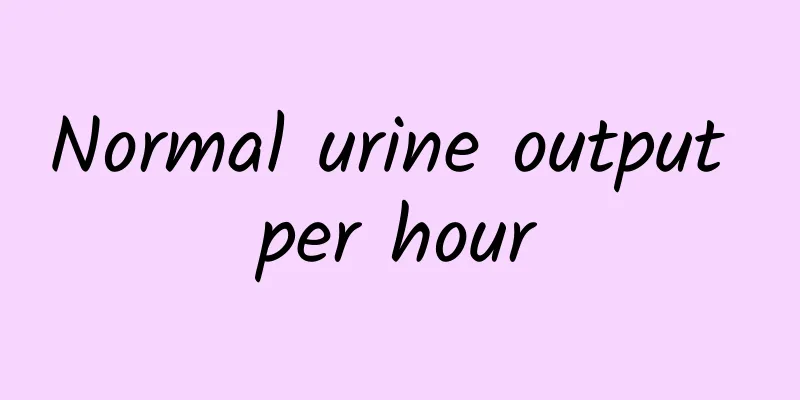Normal urine output per hour

|
Urine volume is generally calculated on a daily basis, mainly referring to the total amount of urine excreted from the human body within one day. Urine volume is an indicator of human health. If the urine volume is abnormal, for example, too much or too little urine, it proves that there are certain problems with human health. Patients need to take active treatment measures to alleviate the symptoms and have a more normal urine volume. So, what is the normal urine volume per hour? 1. Overview of Urine Volume Urine volume refers to the total amount of urine excreted from the body within 24 hours. The amount of urine mainly depends on the glomerular filtration rate, glomerular reabsorption, and dilution and concentration functions. Due to individual differences and different eating habits, the amount of urine excreted per day varies greatly among normal people, but under normal circumstances, the amount of urine excreted per day should be between 0.8 and 2.0L. When people drink too much water, they excrete more urine. When they drink less water and sweat more, the urine volume will decrease. In addition, changes in urine volume are also related to the surrounding environment (temperature, humidity), food type, age, mental factors, activity level, etc. A 24-hour urine volume greater than 2.5L is called polyuria; a 24-hour urine volume less than 0.4L or a urine volume less than 17ml per hour is called oliguria; a 24-hour urine volume less than 0.1L or complete anuria within 12 hours is called anuria. 2. What is the normal urine volume? The urine volume of a normal healthy adult is 1-2L/24 hours or 1ml (h/kg). The ratio of daytime and nighttime urine volume is 2-4:1. The urine volume of children varies greatly from person to person, and is 3-4 times more than that of adults based on body weight. A 24-hour urine volume greater than 2.5L is called polyuria; a 24-hour urine volume less than 0.4L or a urine volume less than 17ml per hour is called oliguria; a 24-hour urine volume less than 0.1L or complete anuria within 12 hours is called anuria. 3. Causes of increased and decreased urine volume 1. Increase Generally, polyuria is when the urine volume in 24 hours is more than 2.5L. (1) Physiologically drinking too much water or drinking too much strong tea or coffee. Mental stress, insomnia, etc.; can also be seen when using diuretics or excessive intravenous infusion. (2) Pathological causes are often due to decreased glomerular reabsorption and concentration functions, such as diabetes, diabetes insipidus, chronic nephritis and neurogenic polyuria. 2. Reduce Urine volume <0.4L/24 hours (or 17ml/hour) is called oliguria; urine volume less than 100ml/24 hours is called anuria or urinary retention. (1) Physiologically, drinking less water and sweating more may lead to a decrease in urine volume before clinical symptoms and signs of dehydration appear. (2) Pathological shock, dehydration, severe burns, acute and chronic nephritis, heart failure, ascites due to cirrhosis, uremia, renal failure, etc. |
<<: Blood in the stool but no pain
>>: What causes decreased urine output?
Recommend
38 weeks butt pain
Pregnancy is a long process for pregnant mothers....
Is yellowing of clothes under the armpits due to body odor?
Body odor is the common name for human bromhidros...
Don't make up for the lack of traditional Chinese medicine
Health preservation is a favorite choice of many ...
How to detoxify the blood
Poor diet may lead to an increase of toxins in th...
How many weeks of pregnancy can rule out ectopic pregnancy
Ectopic pregnancy is a pregnancy phenomenon that ...
Is leek an antidote?
Amaranth generally does not affect the efficacy o...
Can I get pregnant when I'm approaching menopause?
Female friends have not yet fully entered menopau...
How to relieve uterine contraction after eating leeks
We all know that women need to pay special attent...
What is the disease of diarrhea and night sweats?
Different symptoms in the body represent differen...
What does spontaneous sweating mean?
Many people are not very clear about what spontan...
What is gout? Two reasons need attention
Usually, after people find out that they have gou...
Two months old baby's eyelids are swollen
When the baby is two months old, the body is stil...
How much is Bupleurum per pound
The efficacy and function of Bupleurum Root are v...
What will happen to Baidian Crazy?
Vitiligo is a disease that occurs on the surface ...
Which department should I go to for gout? What are the symptoms of gout?
Which department should I go to for gout? Gout is...









